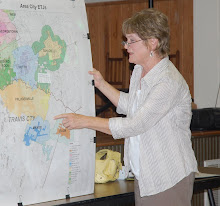John Carona, chair of the Senate Transportation and Homeland Security Committee, has a bill left pending in his committee designed to get state-wide high-speed rail up and running. SB 1570 gives actual authority to the South Central High-Speed Rail and Transportation Corporation to design and fund the Texas T-Bone plan. Right now, the organization is a not-for-profit corporation that advocates for the plan. SB 1570 will turn it into a governmental authority.
There are several problems with the T-Bone design. The T-Bone runs from DFW through Temple and Austin to San Antonio. A leg heads west from Houston through Bryan and meets the north-south leg at Temple. A map is at the THSRTC website www.thsrtc.com.
This is NOT the plan announced by Obama that is on the Federal Railroad Administration website.
http://www.fra.dot.gov/Downloads/RRdev/hsrmap.pdf
The Federal government has designed one plan, and Texas would be designing a different one. Even if a state-wide high-speed rail project was a good idea, which it is not, a major problem with both plans is that neither has a direct connection between the state's two largest centers--DFW and Houston. In the T-Bone plan, travelers would have to go out of the way, through Temple. The Federal version shows Houston on a separate line coming through New Orleans--again, no direct route to Dallas.
An additional roadblock could eventually be the airlines. Back in the 90's, we rural residents organized "De-Rail" groups along the route of the Ben Barnes/French bullet train, and we had some impact. At the same time, Southwest Airlines was fighting the project. Eventually, financing for the project did not come through.
Right now, the T-Bone boosters point out that the airlines are not opposing the T-Bone project. One might say the airlines are not opposing it--YET. This could change.
Based on high-speed rail that is running elsewhere in the world, it's a bad idea for taxpayers. The systems are not self-supporting; they are supported by government funds. In Texas, like the Trans-Texas Corridor, the ultimate goal is not cost-effective transportation for the tax-paying public. The ultimate goal is dipping into the taxpayers' pockets once again for funds for construction companies, consultants, and officials. As always, follow the money.
Subscribe to:
Post Comments (Atom)

No comments:
Post a Comment